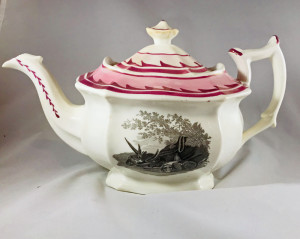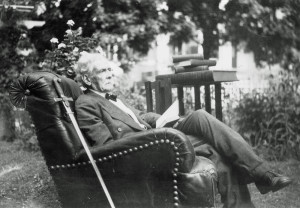True Tales from Canton’s Past: Teacups in the Attic
By George T. ComeauFor anyone who has ever watched Antiques Roadshow, they know that provenance is key to the value of antiques. The dusty old box of china in the attic is just fodder for a yard sale until it can be established that George Washington actually nibbled a piece of toast from the dinner plate. And yet provenance can be established in many ways. Back in November a box of china became the subject of our very own Antiques Roadshow at the Canton Historical Society.

The teapot that was given as a gift to Mrs. John Everett in 1847, now in the collection of the Canton Historical Society
As curators at the historical society, Jim Roache and myself field dozens of calls a year from folks offering to donate items. We have found amazing portraits, Civil War items as well as photographs and letters. I like to think of the “Histy” as Canton’s attic, and for many people they transfer items from their attic to ours. We are called upon to decide whether items should be donated, or whether they have little or no connection to Canton’s history, and thus we demur. Once in a while a truly amazing item comes to us. We privately salivate in the hopes that we can add it to our collection. Such an item has just arrived.
Michael Ablowich reached out in early November. It was a few weeks before Thanksgiving and he was trying to find a home for a tea set that had been in his family for many years. Tea sets are not something that are in vogue today, and while they are very common, this particular tea set has strong ties to Canton, he explained. Ablowich is a tall and distinguished man, the looks of a New England banker, with a warm, engaging smile. Ablowich has had a distinguished career and at one time was the state treasurer for New Hampshire. It was hard to find the connection to Canton, but he explained that his family had ties to Randolph.
After much research, the Canton connection comes from Ablowich’s great grandmother, Adelaine Sophronia Merrill, whose mother was Ida May Coops. In the early 1900s Coops married John Everett, a prominent Foxboro resident whose lineage is entirely distinguished and harkens back to “Captain” John Everett, born in Dedham in 1646. The Everett family has played a major role in local as well as national politics and in the day was one of the most influential families in America. Ablowich had a curled up note that was with the tea set that read: “Pink lustre tea set given by Edward Everett to his cousin’s wife Mrs. John Everett. This Everett was the mother of John Everett of Canton, Mass. whose wife was Ida May Coops Merrill, mother of Adeline Sophronia Merrill Langley.”
The thing to know here is that the tea set was likely a wedding gift given in 1847 to Elisabeth Morse Barrett, “a lady of culture and refinement,” upon her marriage to Colonel John Metcalf Everett. Colonel Everett was born in Foxboro in 1803. He carried on the business of straw manufacturer for many years, and on retiring he bought the hotel called the Halfway House, where he resided for several years, holding court as a justice and managing a farm. He was also selectman and representative. The marriage was an exceptional union between two great New England families.
We know that the tea set was a gift from a lion of Massachusetts and American politics, Edward Everett. At various points in his life, Edward Everett was a pastor, a student at Harvard, a teacher to many — including Ralph Waldo Emerson — a congressman, the governor of Massachusetts, the ambassador to Great Britain, Millard Fillmore’s secretary of state, and a member of the United States Senate. Imagine all that packed into one life — an illustrious career for one of the foremost civil servants in America.
At the time of Mrs. John Everett’s wedding, the elder statesman was the president of Harvard University. It was a difficult time in Edward Everett’s life as the Harvard presidency had taken a toll on his mental and physical health. The marriage was in June, and it is not known whether the statesman attended. We do know that several weeks earlier he wrote from Harvard his observation that it had been “a year of greater anxiety and care and of less intellectual improvement than I remember to have spent. The usual meeting of the Corporation. After the routine of business was over, I made known to the Corporation the entire disappointment I had experienced in the office, its ruinous effect upon my health, and my firm persuasion that I should not be able to hold on.”

John Everett of Canton, in a photo taken when he was 85 years old, with the sword of his father near his right side (Collection of the Canton Historical Society)
Everett did hold on, and oversaw major gifts to the university as well as the restoration of the great seal of Harvard, for which he took great pride as historian who treasured accuracy. Yet the greatest achievement of this man was his passion for anti-slavery causes. In November 1863, when the military cemetery at Gettysburg, Pennsylvania was dedicated, Everett, arguably the finest orator in the country, was invited to be the featured speaker. Everett spoke for two hours, and his oration was followed by the Gettysburg Address of President Lincoln. Everett was deeply impressed by the concise speech and wrote to Lincoln, “I should be glad if I could flatter myself that I came as near to the central idea of the occasion, in two hours, as you did in two minutes.”
And so, the tea set given by the hands of this great American was offered back to the town of Canton and would return to the place that the family felt had the closest connection and affection to the artifact. At some point the tea set passed from Mrs. John Everett to her son, John, who came to live in Canton in 1876. Everett began studying law under Ellis Ames, Esq., and in 1879 was admitted as an attorney and counselor-at-law. Like his predecessors, John was active as a public servant, serving as town moderator, School Committee member, auditor of public accounts, town treasurer, chairman of the Board of Selectmen, and chairman of the water commissioners. In 1905, at the age of 53, he married Ida May Coops and the tea set was in their home on Washington Street. The house is still standing and has always been an impressive landmark. Everett was quite prosperous and was the president and director of Canton Co-operative Bank. Today his home is the Dockray and Thomas Funeral Home, so it is easy to see the tea set in such a grand setting.
What is most amazing about the tea set is the fact that so many pieces have survived over the course of 170 years. There are 26 surviving pieces of what is described as an “early 19th century antique English Sunderland pink luster transferware porcelain tea service, the entire set decorated in the sleeping dog and gamebird motif.” It is both beautiful and impressive. And while rare and desirable on its own, the tea set is returning home to Canton to once again grace us with the history connected to one of America’s finest politicians.
The Canton Historical Society will display the tea set at the public library later this month and people will be able to view these rare items. Most importantly, the Honorable Michael Ablowich has given the town a gift that helps us see our place in the nation and demonstrates the generosity of his family lineage. We remain most grateful.
Short URL: https://www.thecantoncitizen.com/?p=37973










